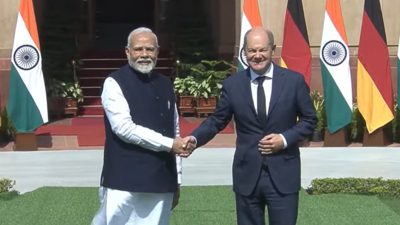Germany to increase number of annual visas for skilled Indian workers to 90,000
NEW DELHI: Germany has committed to increase visas for skilled
Indian workers, raising the annual quota from 20,000 to 90,000 as
part of efforts to deepen bilateral ties.
The announcement came as German Chancellor Olaf Scholz met
with Prime Minister Narendra Modi in New Delhi on Friday, with
both leaders deepen the importance of collaboration in areas
including economic growth, defence, and clean energy.
Chancellor Scholz stressed the decision as a welcoming signal for
skilled workers, saying, “The message is that Germany is open for
skilled workers.” Modi, in turn, praised the agreement, describing
it as a powerful economic link between the countries. “When
India’s dynamics and Germany’s precision meet, when Germany’s
engineering and India’s innovation meet… a better future is decided for the Indo-Pacific and the entire world,” he
said.

The expanded visa programme builds on a migration agreement signed two years ago that facilitates professional and academic mobility. As part of the current deal, Germany has also pledged to streamline its visa application process and improve recognition of Indian qualifications, reducing bureaucratic barriers for Indian professionals. This meeting marked Scholz’s third visit to India since 2023, following his state visit and attendance at the G20 summit. The leaders’ discussions covered mutual interests, with India’s Ministry of External Affairs noting the partnership’s growth over the years. Defence cooperation is also deepening, evidenced by a recent “maritime partnership exercise” in the Indian Ocean aimed at enhancing interoperability between the countries’ naval forces. “Germany and India are committed to more cooperation, not less,” Scholz stated, as both countries expressed interest in strengthening defence ties. However, India and Germany differ on their approaches toward Russia. While Germany strongly supports Ukraine, Modi’s administration has maintained its longstanding ties with Russia, recently affirming cooperation at the BRICS summit attended by Russian President Vladimir Putin. The two leaders also explored India’s push for “green hydrogen” production, which Germany views as vital to its energy transition amid reduced Russian oil and gas supplies. Representatives from both countries signed a “Green Hydrogen Road Map,” with further details yet to be announced.

The expanded visa programme builds on a migration agreement signed two years ago that facilitates professional and academic mobility. As part of the current deal, Germany has also pledged to streamline its visa application process and improve recognition of Indian qualifications, reducing bureaucratic barriers for Indian professionals. This meeting marked Scholz’s third visit to India since 2023, following his state visit and attendance at the G20 summit. The leaders’ discussions covered mutual interests, with India’s Ministry of External Affairs noting the partnership’s growth over the years. Defence cooperation is also deepening, evidenced by a recent “maritime partnership exercise” in the Indian Ocean aimed at enhancing interoperability between the countries’ naval forces. “Germany and India are committed to more cooperation, not less,” Scholz stated, as both countries expressed interest in strengthening defence ties. However, India and Germany differ on their approaches toward Russia. While Germany strongly supports Ukraine, Modi’s administration has maintained its longstanding ties with Russia, recently affirming cooperation at the BRICS summit attended by Russian President Vladimir Putin. The two leaders also explored India’s push for “green hydrogen” production, which Germany views as vital to its energy transition amid reduced Russian oil and gas supplies. Representatives from both countries signed a “Green Hydrogen Road Map,” with further details yet to be announced.
